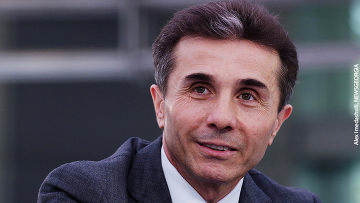Azerbaijan, Baku, Oct.4 / Trend, E.Tariverdiyeva /
Leader of Georgian opposition Bidzina Ivanishvili intends to become Prime Minister, that is, in accordance with new Constitution of Georgia, the main head of the country. Leader of "Georgian Dream", which won the parliamentary elections, Bidzina Ivanishvili said in an interview with Euronews TV channel.
He said at the moment Georgia is not ready to export products to the American or European markets.
"In an initial stage it would be good and interesting for us for us to return to the Russian market, as generally the Georgian businessman is much more familiar with the Russian market. The main problem is that we don't have strong local production. Markets are significant in business, you need production," Ivanishvili said.
He said normalising relations with Russia will not be easy and will take a long time. Firstly, we should work on establishing cultural and trade relations, Ivanishvili believes.
"Only afterwards we should focus on the issue of the territorial integrity of our country, maintaining friendly relations with Russia. Our main strategy is Euro-Atlantic integration, and we do not [intend to] change this strategy, continuing our aspirations towards the European Union and the North Atlantic Alliance," he said.
As for Georgia's EU and NATO membership, in the initial stage it will be quite contradictory, but the country needs to make it work.
"We need to [learn] from the experience of other countries, such as the Baltic states, which have entered NATO and the European Union, as well as managing to normalise their relations with Russia. This is going to be difficult but not impossible," he said.
"I know Russians well. I have a lot of friends there, and possibly it will have a positive influence on our efforts to establish diplomatic relations with the country, but I do not think this will have a significant role in this process. Certainly it will not make this process easier," Ivanishvili noted.
He also said that he has not owned any shares in Gazprom for five or six years. "Besides, I never owned more than a one percent stake. It is more of a rhetorical question, to be honest. In those times Gazprom's stock could be purchased in the morning and sold in the evening. When I had a share in Gazprom I often used to say that it was just a profitable purchase, which I sold profitably as well," Ivanishvili said.
Georgian Central Election Commission has counted data from 3,674 (99.4 percent) out of 3,766 polls so far.
According to initial information, the opposition coalition "Bidzina Ivanishvili - Georgian Dream" continues to lead - 54.9 percent (1,179,930 votes).
The ruling party - "United National Movement-More Benefit for people" ranks second - 40.35 percent (867,102 votes)
They are followed by "Giorgi Targamadze - Christian-Democratic Movement" - 2.04 percent (43,913 votes), "Shalva Natelashvili - Labour Party of Georgia" - 1.2 percent (26,674 votes).
Parliamentary elections were held in Georgia on Oct.1. Around 14 parties and two political blocs participated in the elections.
Parliamentary elections were held in Georgia on a mixed - list, majority system. Around 150 MPs must be elected - 77 on the lists (a passing barrier of five per cent) and 73 - single-seat constituencies.
Parliament will receive more authority in 2013 after amendments to the constitution take effect resulting in the president's power being reduced.






